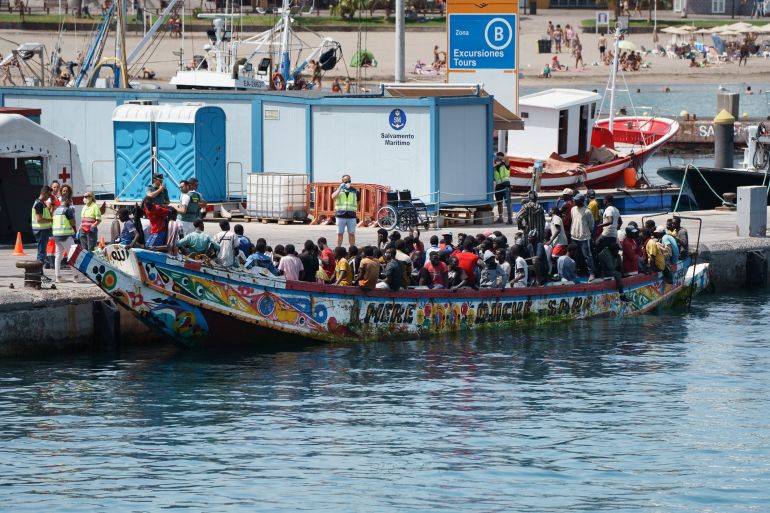One dead in perilous boat journey to reach Spain from Africa
The Spanish coastguard reports the death as it saved 84 others, a day after a similar fatal incident near Senegal.

At least one person has died during an attempt to reach Spain on a boat that had left sub-Saharan Africa, the Spanish coastguard says a day after more than a dozen people on a similar journey drowned near Senegal.
The Spanish coastguard rescued a boat near the island of Gran Canaria on Tuesday, saying that while one person died, 84 people were saved.
Keep reading
list of 3 itemsBaby’s body found on Spain beach from shipwreck: Police
How do EU deals to curb migration balance with human rights duty?
On Monday, a boat attempting the Atlantic migration route to Spain’s Canary Islands capsized near Senegal and at least 15 people drowned.
Every year, thousands of people from sub-Saharan African countries try to reach the Canaries in packed boats, but the Atlantic route has proven deadly.
Last month, up to 39 people drowned after their dinghy sank near the Spanish islands.
In Tuesday’s incident, eight people were taken to hospital. TV footage showed emergency services helping the others by offering blankets and placing some in wheelchairs and on stretchers.
The boat was located 8.5 nautical miles (15.7km) from Gran Canaria island. The passengers were taken to its port at Arguineguin about 5am (04:00 GMT).
Dangerous route
The International Organization for Migration (IOM) said that of the 2,556 people who lost their lives trying to reach Europe last year, 1,126 were on the West Africa and Atlantic route to Spain and 260 were trying to reach Spain over the Western Mediterranean.
“Risks and dangers along the West African Atlantic route remain, and 45 shipwrecks were recorded along this route in 2022, resulting in the death or disappearance of 543 migrants,” the IOM reported in January.
In June, the European Commission laid out a plan to manage migration along the Western Mediterranean and Atlantic routes. It involves tackling smuggling and boosting coordination with non-European Union countries, such as Morocco.
But NGOs and human rights organisations have criticised the bloc, accusing European nations of turning a blind eye to the deaths of refugees.
In a letter released on World Refugee Day last month, about 180 human rights organisations said the EU and its member states have shown “no intention of learning from the past few years and ending the dying in the Mediterranean”.
“Instead, they are escalating their deadly lockdown policies,” they said, referring to the bloc’s latest migration agreement on asylum procedures.